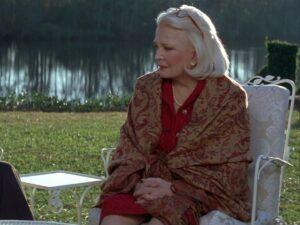In The Toast series today, we pay homage to recently passed Gena Rowlands, the Oscar-winning actress and star of romance blockbuster The Notebook (2004) and take a close look at the beloved role that made her a romance movie icon.
In the opening scene of The Notebook (2004), Allie stands gazing wistfully out the window at sunset. Or is her gaze simply peaceful. Or no, perhaps there is a touch of worry. Or fear. Or something. Just a few moments in, we in the audience are mesmerized. Actress Gena Rowlands, with a sweet shawl around her shoulders, and her hair a dazzling silver-gray, is brilliantly giving us a taste of “something” with her character Allie. This “something” is undefinable, intangible, and yet ironically, completely palpable.
WATCH: 50 Greatest Romance Films of the Century
The cinematic world mourns the loss of Gena Rowlands, who passed on August 14, at age 94, from Alzheimer’s dementia-related complications. Her character of Allie in The Notebook, who was also a dementia sufferer, and beloved wife, mother, and grandmother, who lived out her final days in a tranquil, rustic elder-care facility, was arguably the most iconic character of Gena Rowlands’ illustrious career. And the poignancy of this dementia similarity is sadly noted by many.
Two-time Oscar-nominated actress for A Woman Under the Influence (1974) and Gloria (1980), Gena Rowlands was long known for her rawness and badass screen persona. She had a power onscreen that kept us enthralled in her wonderful grip, and yet she wasn’t merely an emblem of popular 1970s film realism. No, making 10 films with her actor-director husband John Cassavetes primarily between the mid-1960s to mid-1980s, and working with many other skilled New Hollywood directors, Gena could move seamlessly from mainstream to independent films, from characters such as mentally ill wife, to raucous, gun-toting child protector on the rough streets of New York City.
In all, Gena Rowlands’ rich, versatile film career spanned a whopping seven decades. From “possibly pregnant” wife in her debut film (enter 1958’s comedy The High Cost of Living and cue one deliciously prim and prom breakfast routine!), to her final film of Six Dance Lessons in Six Weeks in 2014, Gena was the envy of many in the film industry. Hollywood knew that they could call on her to successfully play any role, and they did. And for that, she was awarded an Honorary Oscar in 2015 for a lifetime of stellar performances. But back to that romance. And that mysterious gaze out the window at sunset.
The Sweet Magic of The Notebook
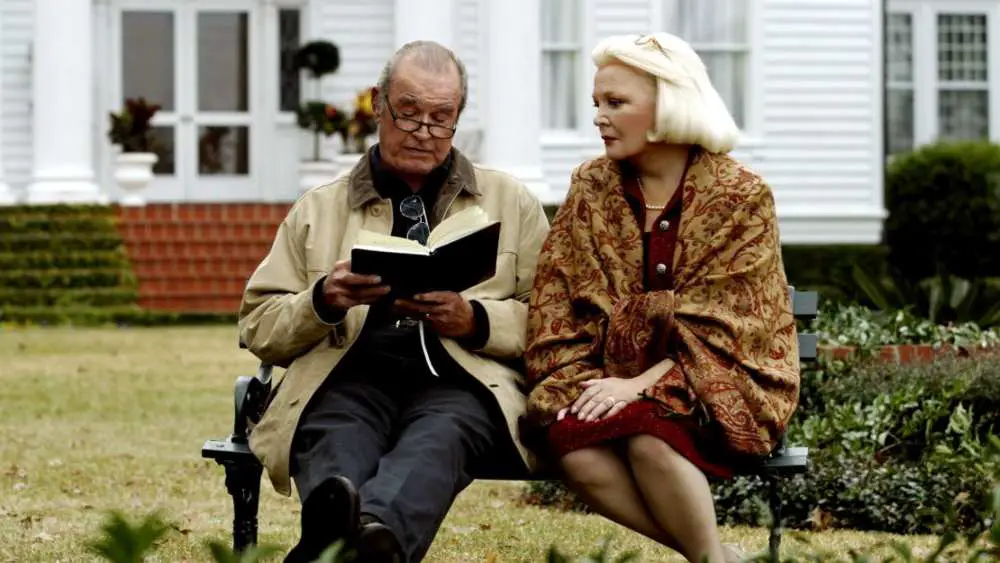
Ask any “romance” movie buff for a list of their favorite films. High chances are The Notebook is on it. A story about a kindly elderly man (actor James Garner) reading a romance tale from a notebook to an equally kindly elderly woman (Gena Rowlands) in an eldercare home, The Notebook is a sweeping “romance whodunit” of sorts. This movie is a vibrant flashback piece, where we continually wonder who the seemingly platonic couple is, who is enjoying the story in present day, and who the colorful couple is who is portrayed in the romance story from years ago. A little confusing? Yes, mischievous Cupid earns a point. Mission accomplished from The Notebook’s outset.
The older man reading from his notebook takes his female listener, and us in the audience, on a most riveting 1940s journey. We start in sweet, idyllic Seabrook, South Carolina, then race on over to dangerous World War II Europe, then back across the Atlantic to bustling post-war Charleston, South Carolina, and finally, back to the charming sleepy town of Seabrook.
So, flashback #1. We’re in sweet, idyllic Seabrook. We first meet teenaged Noah Calhoun (actor Ryan Gosling) in the summer of 1940. He sees Allie Hamilton (actress Rachel McAdams) at a carnival and instantly falls head over heels for her. At first angered (and dare we say repulsed?) by Noah, Allie softens to Noah quickly. Quite simply, they hit it off. And so begins one of the best “summer romances” ever captured on screen. Cue bike rides, a beautiful beach romp, midnight kisses, jumps in the pond from a down-home rope swing, and a whole lotta laughs. And oh yes, there’s even one ice cream cone delightfully smushed in the face. Slurp!
Noah and Allie fall in love in the most magnificently ordinary way, and yet theirs isn’t a perfect romance. Both are fiery, passionate, and not ones to keep their frustrations or misgivings to themselves. The Notebook is wise to make this romance not solely a confection dolloped with saccharine sweetness. Instead, The Notebook gives us savory along with the sweet. These two characters are rich and multi-faceted, not matte and one-dimensional.
The Sadness of Noah and Allie
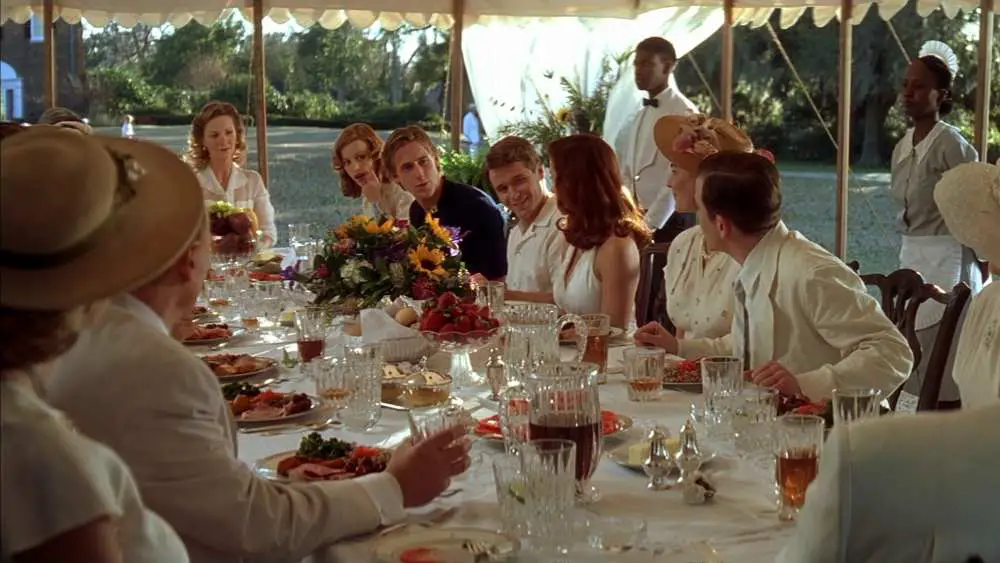
But unfortunately, all is lost when we find out that Allie’s parents don’t approve of their daughter’s romance, as Noah is merely a lumber worker making lean wages. He would never be good enough for their wealthy family. This sweet summer romance then officially gets complicated. Cut to an abrupt end-of-summer separation, and a hugely consequential seven years to follow, where Noah and Allie have no contact. Sigh.
The details of Noah and Allie’s time apart are stunning. Cut to lovelorn letters never delivered, a new young man enamored with Allie who can match her family’s wealth, a World War II tour of duty in blustery, bloody Europe, and finally, a beautiful white home fashioned with blue shutters, and constructed with love and deep, deep, unwavering hope.
Directed by Gena Rowlands’ son, Nick Cassavetes, who follows in the footsteps of his powerhouse filmmaking father, The Notebook weaves a love story of shimmery cinematic legend. For as unknown as the identities and connections are of the film’s four main characters, there is, however, no mystery in what this film is. The Notebook is a ROMANCE. Yes, in all caps. And while some critics have commented on the film’s sticky-sweet melodrama as being a turnoff, even despite its lovebirds’ multi-faceted fire, audiences have enthusiastically embraced The Notebook’s brand of romance.
It consistently ranks high on “Millennial romance movie” lists. To boot, it also has inter-generational appeal, given the 1940s flashback setting, and the older characters portrayed by Gena Rowlands and James Garner. Older audiences love The Notebook, too. And older audiences feel a kinship with veteran actress Gena Rowlands.
Gena as Allie
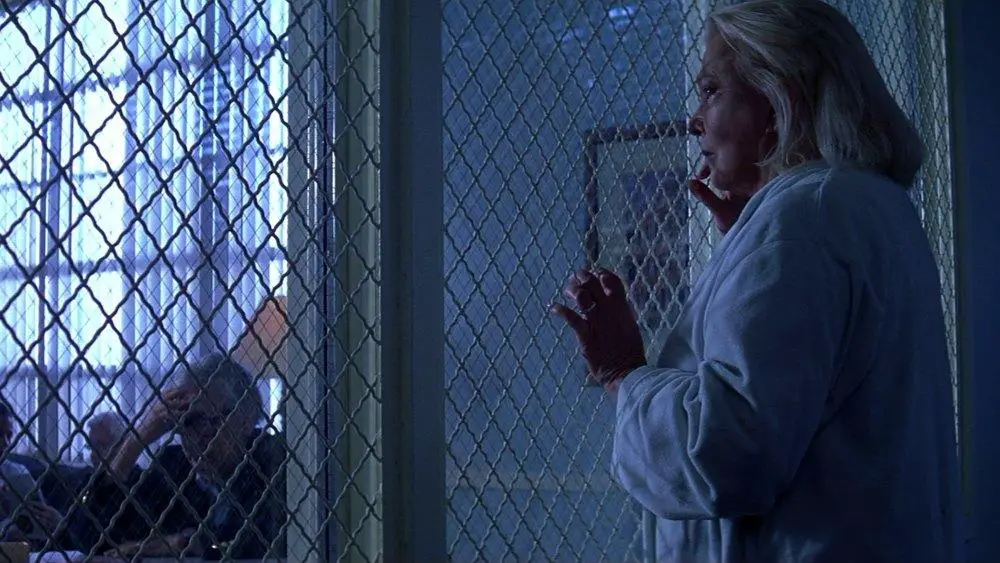
Hard to forego spoilers, but we learn toward the end of The Notebook that the elderly woman being read to is Allie. And she’s being read a romance story that she herself wrote a few years earlier, before her dementia took hold, and before this devastating, progressive brain disease could diminish all of her treasured memories. We also learn that the man she chose to marry back in the 1940s was not her wealthy college love, but instead Noah, her childhood love. And that person reading to her from the notebook is Noah. This was their love story. Cupid not only scores a point, but earns a big, bright, 1940s red lipstick kiss. Noah and Allie ended up together! The mystery of this romance is solved!
Gena Rowlands is sublime in delivering this gratifying moment of self-realization on film. Sitting at a romantic, candlelit dinner table across from this interesting man reading to her this interesting love story from a notebook, she suddenly remembers. She remembers that he is not an “interesting man” reading to her an “interesting love story.” No, this is her cherished husband, the love of her long life, father to her children, and her soulmate. It’s Noah. Allie flashes a look. Her eyes well up with tears. She says, “I remember now. It was us. It was us. It was us.” The two grasp for each other, their passion still burning after all these years, and no doubt after all of Allie’s murky moments of memory loss. The gray of the night dissolves, and their love is like a yellow fire again, bold and strong in daylight.
Gena is masterful in conveying this hugely monumental, profound revelation, and doing so with commendable, delicate subtlety. It’s a highwire balancing act, where she could’ve easily tipped into an over-the-top character reveal. But instead, she gives us little meaningful beats. And the end result is wonderfully greater than the sum of its parts. It’s a thoughtful, downturned head. It’s a look. It’s a tear. It’s then a reaching for her husband.
Onscreen Power
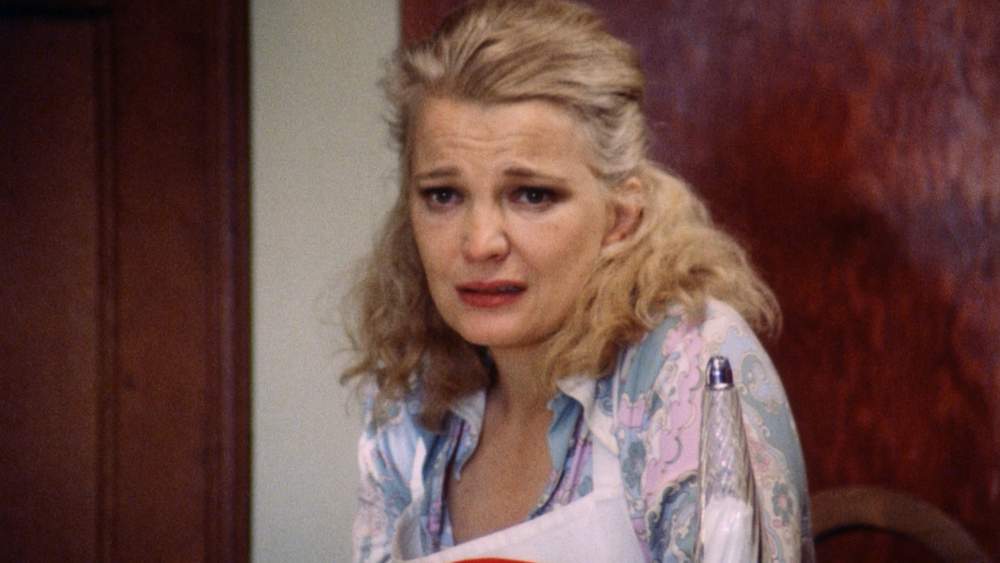
For anyone who has witnessed Gena Rowlands in the “across the table” scene with Peter Falk in A Woman Under the Influence (1974), we know how enthralling Gena Rowlands can be in the most ordinary of settings. We in the audience are not just eager, but desperate to watch her. She provides a promise fulfilled, where she imbues her character with such vulnerable humanity.
In the case of The Notebook, we see an older woman who we’ve been intrigued with, and grown to like, from the start of the film. Her personality has been kind, quiet, polite, and at times, enthrallingly perplexed and troubled. Further, her appearance and wardrobe are attractive, almost regal. We wonder, “Why is this woman in an eldercare home?” She could be our mother, our grandmother. We feel affection for her, and concern. Only a talented actress like Gena could help us to feel all of this, and to say so much by ironically saying relatively little by way of dialogue.
All told, The Notebook is a romance film that delivers, and Gena Rowlands was an integral component to its commercial success and cult classic following. Based on the 1996 Nicholas Sparks novel, The Notebook took a love story and made it next level, thanks to skilled screenwriting, direction, skilled acting up-and-comers Ryan Gosling and Rachel McAdams, and beautiful art direction, costuming, and musical score.
One could argue that all these components made it hard for this movie to miss. But, like any great actor, Gena Rowlands made her part look so easy. And the fact that Gena was reluctant to take the part of Allie, as Gena’s own mother had battled Alzheimer’s, is another note of poignancy not lost to fans this month. Gena knew that this role would be hard for her on a personal level, and fans are especially grateful. Gena once said about The Notebook, “It was a tough, but wonderful movie.”
Conclusion
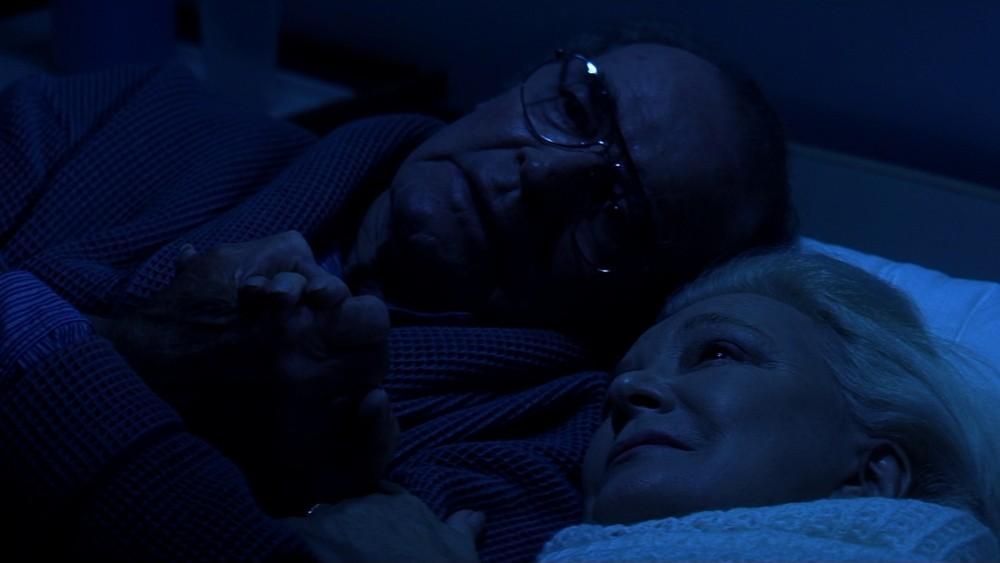
As we cut to Noah and Allie at a small twin bed at night, an older couple who have lived many long decades together, wrapped in deep love and devotion, we feel compassion for their lives and their inevitable experience of time. Allie whispers to Noah in a fragile voice, moonlight seeming to beam down onto her dazzling silver-gray hair, “Do you think that our love can create miracles?” Noah whispers back, “Yes, I do. That’s what brings you back to me each time.” He soon cuddles up to her on the twin bed, and they both fall asleep peacefully, holding hands. They pass away together before morning. Thank you, Gena Rowlands, for your beautiful performance in The Notebook, and for your trailblazing, entertaining lifetime of film.

